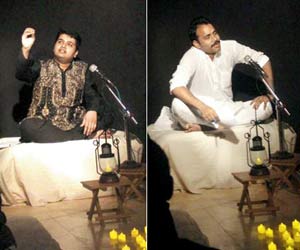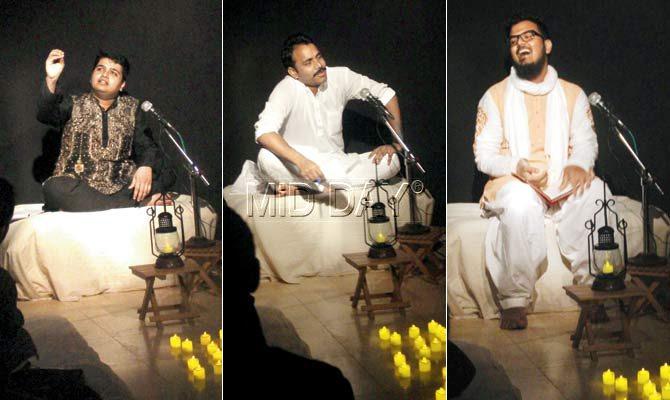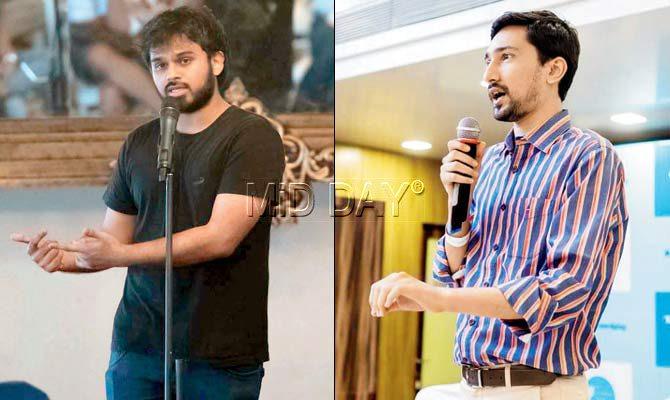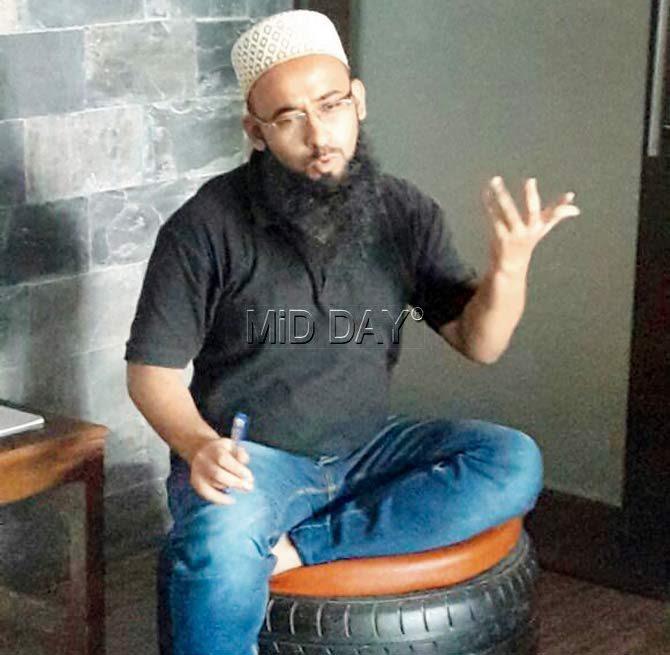Here's how a bunch of poetry collectives and new-age poets are keeping Urdu alive and relevant through ghazal writing workshops, mushairas and poetry slams

The dim light of candles engulfs Andheri's Harkat Studios in a warm glow. A 25-member audience settles on the mattresses around an elevated gadda under a spotlight. The mushaira's (poetic symposium) setting is perfect. Before seven Urdu shayars begin the performance, Devroop Sharma of Irshaad poetry collective acquaints the audience with the basics: Say 'mukarrar' for an encore and 'waah waah' as applause.

(Clockwise from top) Artistes Devroop Sharma, Khan Faisal Barkaati and Ashwani perform at the mushaira held last weekend. Pics/Tanvi Phondekar
ADVERTISEMENT
For the next two hours, the fragrance of Urdu fills the room as the shayars - including 20-year-old Khan Faisal Barkaati, and Ashwani, who recites poetry in a Haryanvi accent - share original nazms on love, heartbreak, politics, education and motherhood. They make it interactive, asking the audience to complete a misra (a couplet line). They also ensure the guests aren't overwhelmed by the language, by explaining the meaning of lesser-known words like ilm (knowledge) and baa-safaa (chaste) before narrating the verses. Some members in the audience repeat the words under their breath to savour their taste. One of them, Sankalp Rawal, tells us after the show that was held last Saturday, "I understood 70 per cent of what was recited but still enjoyed the performance."

Shamir Reuben and Hussain Haidry
For Sharma, that's an achievement. "The idea isn't to spoon-feed but help expand your vocabulary. When you don't understand a word, you look it up and then, enjoy the shayari more. It stays with you even after the performance," says the 29-year-old poet and salsa dance teacher, who launched Irshaad six months ago, to promote regional language poetry.

Mohammed Sadriwala
Urdu takes the centre stage
Recent months have seen a spurt in groups supporting the language. Earlier this year, Studio Tamaasha kicked off Urdu Readings, a series of dramatic readings of Urdu short stories, conceived with the help of academic Aslam Parvez. Its finale will be held on October 28.
The Poetry Club (TPC) introduced Mehfil, where members discuss popular Urdu poets, besides Hindi and English. "We wanted to challenge the notion that Urdu is difficult to understand. We use words from it in everyday conversation without realising it. Like, darwaza," says Ankita Shah, co-founder of TPC, which will host the next session in November at G5A.
Write and learn
Workshops that help you hone Urdu poetry skills are also finding takers. Last month, Karan Talwar, curator at Harkat Studios, collaborated with Sharma to present a ghazal-writing workshop. Led by college professor Abhishek Choudhary, it deconstructed the form to drive home the point that every ghazal uses the same kind of metre. "The idea was to help the participants realise that a ghazal isn't difficult to master, if you know the math of it," says Talwar. On October 27, the duo is also collaborating for Kissagoi, comprising theatrical readings of original Urdu stories by three young poets.
Meanwhile, a Hindi and Urdu spoken word masterclass, titled Lafzon Ki Kaarigari, saw 15 participants aged 18 to 40 in attendance. Held last Sunday, it was curated by YourQuote, a mobile app for writers to share original poetry. The 25-year-old poet Mohammed Sadriwala, who conducted it with fellow poet Rakesh Tiwari, says he was impressed at the turnout. "When I started out in 2014, I saw eight out of 10 poets performing in English at open mics. Today, over 50 per cent use Urdu in their performance. It's more expressive. There's also a certain pride in performing in your own language," he observes. Another masterclass is scheduled for next month.
"Of the 2.5 lakh Indian users of our app, 35 per cent [87,500] prefer writing in Hindi and Urdu. That's also because today, more content consumed online is in regional languages," says the app's co-founder Harsh Snehanshu.
Case in point: 31-year-old Indore-born, Mumbai-based Hussain Haidry's poem, Hindustani Musalmaan, which went viral as soon as Kommune launched it on its platform in February, and at last count had seen 5 lakh views. "People are more receptive and attentive to Urdu. Credit goes to [Delhi-based] organisations such as Rekhta Foundation, which are responsible for reviving and preserving the language," says Haidry, a go-to artiste to add to the line-up at Hindustani poetry performances. He also narrated his poems at The Urdu Exhibit, a launch event for Design Fabric's latest issue featuring artworks themed on the language.
Haidry will perform next on October 12 at a Hindi-Urdu poetry open mic at The Cuckoo Club, curated by Kommune as a prelude to their debut spoken word festival. "We've also prepared a list of new, young poets writing in the language. A pure Urdu poem may be difficult to understand but the younger poets are mixing it with Hindi to make it conversational and audience-friendly. It also has a greater impact when used to make a political and social commentary. While at it, they are keeping Urdu alive," says Shamir Reuben, member of the storytelling collective.
Poetry meets activism
Talwar adds that celebrating Urdu is important in today's political scenario. "Recently, at a curatorial workshop in Delhi, I learnt that India doesn't have an Islamic art gallery. That's strange considering it's an integral part of our culture. At a time when Islamic influences in Indian art and culture are being underplayed, curating Urdu-focused events is our shot at activism, where we try to rediscover the language in a safe space."
 Subscribe today by clicking the link and stay updated with the latest news!" Click here!
Subscribe today by clicking the link and stay updated with the latest news!" Click here!







